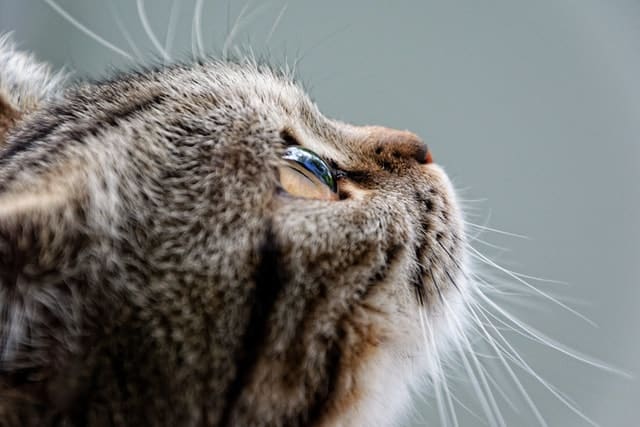
Coughing is a cat’s defense mechanism to eliminate secretions and foreign bodies or is a sign of multiple respiratory or heart disease.
If you hear your cat cough, know that coughing is a reaction of the body that tries to eliminate accumulated secretions or foreign bodies in the airways or it is a warning sign of respiratory or heart disease. Let’s see what there is to know about cough in cats.
The cat and the cough

Understanding why your cat is coughing is the first step in finding a solution and overcoming the problem. In fact, sneezing is often confused with coughing. To distinguish cough from sneezing, remember that when a cat coughs it has its mouth open, when it sneezes its mouth is closed.
In order not to make the cat take risks, observe it and analyze the context in which it is found: it can cough from an infection, an irritation from external or irritating causes (dust, chemicals, cigarette smoke) or have an illness.
Associated with cough, the cat can: sneeze, vomit, have nasal and / or eye secretions, hoarseness, fainting, noises while breathing and a feeling of suffocation.
Causes of cat cough
The two possible and most common causes of Pussycat cough are colds and hairballs. The latter are formed while the cat licks itself, cause a dry cough and sometimes hoarseness and are expelled by the cat quickly with vomiting. The other reasons for cough in cats are:
- collar too tight;
- allergies caused by dust, pollen, smoke, perfumes or household cleaners. The cat can also have secretions, sneezing and itching;
- foreign bodies blocking the animal’s mouth, nose or throat;
- asthma, is a disease of the cat’s respiratory system and can be caused by obesity and stress (didn’t you know? Even cats can suffer from stress and anxiety). It is associated with breathing difficulties and abnormal noises during breathing;
- flu or pneumonia associated with hoarseness, secretions and, in severe cases, fever;
- heart disease; the cat coughs while playing or moving
- acute or chronic bronchitis;
- lung or heart parasites, associated with weight loss, apathy and lack of appetite;
- other bacterial, viral or fungal respiratory diseases;
- cancer, more common in older cats.
The diagnosis
To make a correct diagnosis, the vet needs as many elements as possible. As previously mentioned, after observing cat and the surrounding environment, report to the doctor everything you have noticed: presence of chemicals, duration, frequency, intensity and type of cough and when he coughs (when he is outside, when he plays, when runs etc.)
After this first step the vet may need other items and proceed with urinalysis, blood, x- ray, CT scan, MRI, laryngoscopy or bronchoscopy.
Cat cough: treatments and cures
After making the diagnosis and identifying the cause of the discomfort, the vet will tell you how to treat your cat’s cough.
He may prescribe bronchodilators, antibiotics, antihistamines or corticosteroids or antiparasitics, in the case of hairballs he may suggest to change diet or give malt paste. Follow your doctor’s prescriptions on the duration of treatment to the letter.
In the most serious cases, the cat can be hospitalized so that it is helped to breathe with the help of oxygen.






